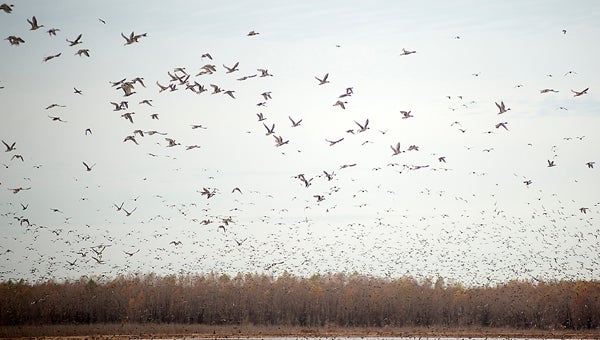Additional birds diagnosed with HPAI in Louisiana, more reported cases in Mississippi
Published 2:40 pm Thursday, December 8, 2022

- Brittney Lohmiller / The Natchez Democrat — Thousands of ducks fly in between levees at St. Catherine Creek National Wildlife Refuge during their migration to the lower Mississippi River. Green winged teal, gadwall, pintail and mallard are among the different species of ducks that will migrate to the refuge.
|
Getting your Trinity Audio player ready...
|
Trey Iles
Louisiana Department of Wildlife and Fisheries
BATON ROUGE — Several captive birds in northeast Louisiana have died from H5NI Highly Pathogenic Avian Influenza (HPAI), also known as bird flu, the Louisiana Department of Wildlife and Fisheries (LDWF) announced. The disease also was discovered and confirmed by the National Veterinary Services Laboratory (NVSL) in October in hunter-harvested blue-winged teal in southwest Louisiana.
Birds from Avoyelles, Calcasieu, Morehouse, Ouachita and Richland parishes have tested positive.
HPAI has been detected in wild birds, domestic poultry, or both in 49 states and resulted in the death of over 3,000 wild birds and nearly 48 million domestic birds (poultry). Waterfowl can become sick and die from the disease, however, many birds are carriers that do not show clinical signs. LDWF routinely investigates reports of sick or dead bird events if large numbers are impacted. Waterfowl species and pelicans are among the birds that the disease is affecting.
The Mississippi Department of Wildlife, Fisheries, and Parks (MDWFP) has received many reports of sick or dead birds over the past week. MDWFP staff has assisted USDA Wildlife Services with taking samples from some of these reported birds to submit for HPAI testing, and positive cases are expected to rise when results are received.
Most of the reports so far have involved sick or dead snow and Ross’s geese, but other species have also been impacted.
The Center for Disease Control considers H5N1 HPAI a low risk for public health. While the virus presents a low risk to humans, it is important to avoid contact with sick birds. Also, be mindful that hunting equipment may transport the virus. If you hunt waterfowl and have backyard poultry, plan for added biosecurity measures (http://www.bah.state.mn.us/media/HPAI-Notice-Backyard-Final.pdf) to keep your flock healthy.
Some general safety guidelines for hunters and others handling wildlife and their tissues include:
- Do not handle or eat sick game.
- Field dress and prepare game outdoors or in a well-ventilated area.
- Wear rubber or disposable nitrile gloves while handling and cleaning game.
- When done handling game, wash hands thoroughly with soap or disinfectant and clean knives, equipment, and surfaces that were exposed to game with hot soapy water and a 10% bleach solution.
- Do not eat, drink or consume tobacco products while handling animals.
- All game should be cooked thoroughly to an internal temperature of at least 165° F.
- Avoid contact with surfaces that appear to be contaminated with feces from wild or domestic birds.
- Hunters should not feed organs, viscera or carcasses to retrievers or leave carcasses to be consumed by other wildlife.
Some other protective measures include:
- As a general rule, observe wild birds from a distance, do not attempt to handle wild animals. Avoid contact with domestic birds (poultry) that appear ill or have died.
- People who work with poultry and wild birds should receive the annual influenza (flu) vaccine. This action reduces the potential for genetic changes in avian influenza, which may render the virus more apt to infect people, thus increasing the potential of pandemic influenza.
LDWF is continuing to monitor for HPAI throughout the state as will the MDWFP in Mississippi.
Other sources of information concerning HPAI can be found at the following links:
U.S. Fish and Wildlife Service Avian Influenza: https://www.fws.gov/avian-influenza
USDA Animal and Plant Health Inspection Services (APHIS): https://www.aphis.usda.gov/publications/animal_health/fsc_hpai_hunters.pdf
USGS National Wildlife Health Center: https://www.usgs.gov/mission-areas/ecosystems/avian-influenza
USDA APHIS: https://www.aphis.usda.gov/publications/animal_health/fs-manage-wildlife-prevent-ai.508.pdf






